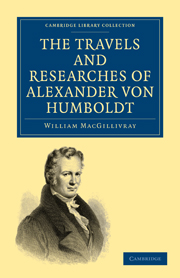 The Travels and Researches of Alexander von Humboldt
The Travels and Researches of Alexander von Humboldt Book contents
- Frontmatter
- PREFACE
- Contents
- CHAPTER I INTRODUCTION
- CHAPTER II VOYAGE FROM CORUNNA TO TENERIFFE
- CHAPTER III ISLAND OF TENERIFFE
- CHAPTER IV PASSAGE FROM TENERIFFE TO CUMANA
- CHAPTER V CUMANA
- CHAPTER VI RESIDENCE AT CUMANA
- CHAPTER VII MISSIONS OF THE CHAYMAS
- CHAPTER VIII EXCURSION CONTINUED, AND RETURN TO CUMANA
- CHAPTER IX INDIANS OF NEW ANDALUSIA
- CHAPTER X RESIDENCE AT CUMANA
- CHAPTER XI VOYAGE FROM CUMANA TO GUAYBA
- CHAPTER XII CITY OF CARACCAS AND SURROUNDING DISTRICT
- CHAPTER XIII EARTHQUAKES OF CARACCAS
- CHAPTER XIV JOURNEY FROM CARACCAS TO THE LAKE OF VALENCIA
- CHAPTER XV JOURNEY ACROSS THE LLANOS, FROM ARAGUA TO SAN FERNANDO
- CHAPTER XVI VOYAGE DOWN THE RIO APURE
- CHAPTER XVII VOYAGE UP THE ORINOCO
- CHAPTER XVIII VOYAGE UP THE ORINOCO CONTINUED
- CHAPTER XIX ROUTE FROM ESMERALDA TO ANGOSTURA
- CHAPTER XX JOURNEY ACROSS THE LLANOS TO NEW BARCELONA
- CHAPTER XXI PASSAGE TO HAVANNAH, AND RESIDENCE IN CUBA
- CHAPTER XXII VOYAGE FROM CUBA TO CARTHAGENA
- CHAPTER XXIII BRIEF ACCOUNT OF THE JOURNEY FROM CARTHAGENA TO QUITO AND MEXICO
- CHAPTER XXIV DESCRIPTION OF NEW SPAIN OR MEXICO
- CHAPTER XXV STATISTICAL ACCOUNT OF NEW SPAIN CONTINUED
- CHAPTER XXVI MINES OF NEW SPAIN
- CHAPTER XXVII PASSAGE FROM VERA CRUZ TO CUBA AND PHILADELPHIA, AND VOYAGE TO EUROPE
- CHAPTER XXVIII JOURNEY TO ASIA
CHAPTER XVI - VOYAGE DOWN THE RIO APURE
Published online by Cambridge University Press: 29 August 2010
- Frontmatter
- PREFACE
- Contents
- CHAPTER I INTRODUCTION
- CHAPTER II VOYAGE FROM CORUNNA TO TENERIFFE
- CHAPTER III ISLAND OF TENERIFFE
- CHAPTER IV PASSAGE FROM TENERIFFE TO CUMANA
- CHAPTER V CUMANA
- CHAPTER VI RESIDENCE AT CUMANA
- CHAPTER VII MISSIONS OF THE CHAYMAS
- CHAPTER VIII EXCURSION CONTINUED, AND RETURN TO CUMANA
- CHAPTER IX INDIANS OF NEW ANDALUSIA
- CHAPTER X RESIDENCE AT CUMANA
- CHAPTER XI VOYAGE FROM CUMANA TO GUAYBA
- CHAPTER XII CITY OF CARACCAS AND SURROUNDING DISTRICT
- CHAPTER XIII EARTHQUAKES OF CARACCAS
- CHAPTER XIV JOURNEY FROM CARACCAS TO THE LAKE OF VALENCIA
- CHAPTER XV JOURNEY ACROSS THE LLANOS, FROM ARAGUA TO SAN FERNANDO
- CHAPTER XVI VOYAGE DOWN THE RIO APURE
- CHAPTER XVII VOYAGE UP THE ORINOCO
- CHAPTER XVIII VOYAGE UP THE ORINOCO CONTINUED
- CHAPTER XIX ROUTE FROM ESMERALDA TO ANGOSTURA
- CHAPTER XX JOURNEY ACROSS THE LLANOS TO NEW BARCELONA
- CHAPTER XXI PASSAGE TO HAVANNAH, AND RESIDENCE IN CUBA
- CHAPTER XXII VOYAGE FROM CUBA TO CARTHAGENA
- CHAPTER XXIII BRIEF ACCOUNT OF THE JOURNEY FROM CARTHAGENA TO QUITO AND MEXICO
- CHAPTER XXIV DESCRIPTION OF NEW SPAIN OR MEXICO
- CHAPTER XXV STATISTICAL ACCOUNT OF NEW SPAIN CONTINUED
- CHAPTER XXVI MINES OF NEW SPAIN
- CHAPTER XXVII PASSAGE FROM VERA CRUZ TO CUBA AND PHILADELPHIA, AND VOYAGE TO EUROPE
- CHAPTER XXVIII JOURNEY TO ASIA
Summary
The town of San Fernando, which was founded only in 1789, is advantageously situated on a large navigable river, the Apure, a tributary of the Orinoco, near the mouth of another stream which traverses the whole province of Varinas, all the productions of which pass through it on their way to the coast. It is during the rainy season, when the rivers overflow their banks and inundate a vast extent of country, that commerce is most active. At this period the savannahs are covered with water to the depth of twelve or fourteen feet, and present the appearance of a great lake, in the midst of which the farm-houses and villages are seen rising on islands scarcely elevated above the surface. Horses, mules, and cows, perish in great numbers, and afford abundant food to the zamuros or carrion vultures, as well as to the alligators. The inhabitants, to avoid the force of the currents, and the danger arising from the trees carried down by them, instead of ascending the course of the rivers, find it safer to cross the flats in their boats.
San Fernando is celebrated for the excessive heat which prevails there during the greater part of the year. The travellers found the white sand of the shores, wherever it was exposed to the sun, to have a temperature of 126·5°, at two in the afternoon. The thermometer, raised eighteen inches above the sand, indicated 109°; and at six feet, 101·7°.
- Type
- Chapter
- Information
- The Travels and Researches of Alexander von HumboldtBeing a Condensed Narrative of his Journeys in the Equinoctial Regions of America, and in Asiatic Russia; Together with Analyses of his More Important Investigations, pp. 202 - 218Publisher: Cambridge University PressPrint publication year: 2009First published in: 1832


